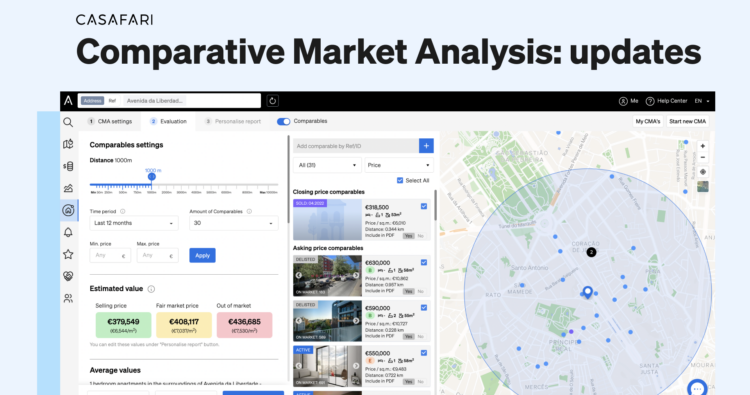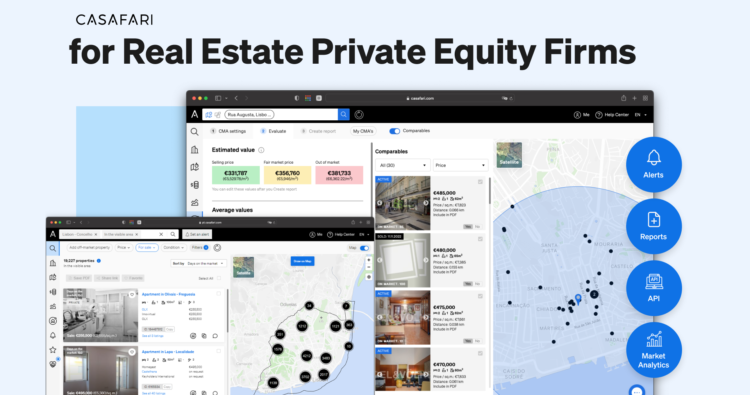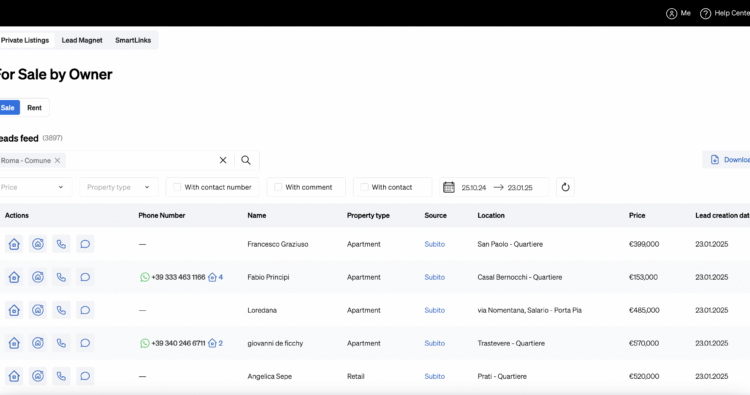Gonçalo Nascimento Rodrigues is a consultant, trainer and author focused on Property Finance. After all, what does a Property Finance Advisor do? How do you measure local demand? And what does a real estate bubble mean?
The author of “Out of the Box” gives a real lesson, in this conversation with CASAFARI.
Fasten your seatbelts and follow us on this journey through the property market in the eyes of a financier.
What does a Property Finance Advisor do? What is your day-to-day life like?
My role is to help buyers and investors make decisions. I can just do a valuation report, for example. I am an expert valuer, registered with the CMVM (Portuguese Securities Market Commission), and fundamentally I do investment property valuations.
It may be necessary to do a market study, to estimate the profitability of an investment, or to point out the adjusted purchase value of a property. It may also be necessary to “go to market” and be more hands-on, buying properties on receiving investor mandates, doing the whole research and acquisition process.
However, I always had the feeling that our market had huge deficiencies. So, years ago, I started to design and structure specific training programmes in this logic of investment and real estate finance. Basically, to simplify the language and demystify the housing market. In addition to what has already been mentioned, I am the coordinator of a post-graduate course at ISCTE (University Institute of Lisbon) and I teach a course on investment analysis.
How can we equip the end customer for real estate education?
When talking about an investor or a buyer, the principles are completely different. I am a very rational person, but even I realize that the decision-making when choosing a home is fundamentally emotional.
The decision between buying and renting, from the perspective of house choice, should be anchored in a time frame. Normally people should buy a house when they already have certain family and professional stability (such as an open-ended work contract, another child on the way…), because otherwise it should always be rented.
The decision to buy should be intrinsically linked to a longer term of stability, we know that in the medium and long term real estate always tends to increase in value.
Education involves explaining the differences between buying and renting, which are not only financial. Because people tend to look exclusively at a bank payment and the value of the rent, as the payment is lower, everyone says that’s a no-brainer, but it’s not limited to that, or at least it shouldn’t be.
What questions must be asked to put the rational into action, in a decision that is so linked to the emotional?
The questions have a lot to do with this: stability, how long you can occupy the property, where you work, the choice of school for your children, the quality of life you gain (or lose) by choosing a certain location or type of property. And, of course, what people like or favour most in a property.
Everyone tends to focus more on the characteristics of supply and comparables, but what actually drives the property market and conditions the formation of cycles is not supply, but demand. The offer is reactive. You have to know the demand well to have indications about what offer you have to raise or develop. As demand is very emotional, it is sometimes difficult to typify supply.
During the pandemic, people looked for open spaces, balconies, further away from urban centres, what does the supply side do? It tries to react, to make the product available, but it takes time to do so. And because of that, we still live in a cycle with a very large lag between demand and supply. Because the offer was prepared for the typification of demand in pre-covid urban centres, in the city centre, with small apartments. Demand must be measured, but supply is more easily measurable than demand.
And how is local demand measured?
There’s only one way: anyone who thinks they can be working in the property market in front of a computer looking at statistics and databases, is on the wrong side. Real estate is street, it is a relationship activity that is embodied in a transaction. And this one, for bringing together such micro-local characteristics, doesn’t give any other chance, other than being on the street.
This means interacting with an entire ecosystem that surrounds real estate. Everything that is commerce, services, equipment, accessibility, because that is what the final buyer is looking for. Statistics show trends, very much at a macro level, even at the county level, and read the market, but they do not allow us to make investment decisions.
Can we talk about a “national property market”?
Those who work in the real estate market are fully aware that it is very micro-local. The issue is that there aren’t enough statistics in quantity and quality to be able to characterise the local market in the same way as the national market.
If I give you figures and data on a municipality, it’s from a macro perspective. But that’s because there’s no data, because if there was at the neighbourhood and street level, it could be done. It is worth remembering that the property market in Portugal is small, we only sell 180,000 properties a year. The metropolitan area of Lisbon and Porto together transact around 60% of the market.
What significant differences to note post-pandemic, other than those felt in the residential market?
I think we may have a paradigm shift globally in investment decision-making. Investors, historically, looked for offices and retail. Until recently, housing was an alternative segment, today it is a priority.
It is not only Portugal that is experiencing growing housing inaccessibility. If it is difficult for a Portuguese citizen to buy a house, it is even more difficult for an Irishman or a German, for example. This has to do with looking at residential assets as an investment asset.
What does the housing bubble mean and what state is Europe in?
This is a subject followed by several banks, such as the IMF, European Central Bank etc, but it is not enough to say that prices are going up a lot to say that the market is in a bubble. There are three aspects that must be met.
First, there has to be a sharp rise in house prices over a certain period of time. Then, there has to be a sufficiently wide and significant territorial dynamic to characterise a property bubble. Lisbon and Oporto may have a real estate bubble due to the rise in prices, but this cannot be generalised to the whole territory.
Finally, it must be evident that this price rise is fundamentally fuelled by debt. If not, the market is only increasing in value. It may appreciate too much and correct, which is part of real estate cycles, but this does not mean that there is a bubble and that it will burst.
What is a debt-fuelled bubble?
There is proof that the market buys permanent housing with recourse to mortgages. And that’s not the scenario today. Between 2007 and 2010 the property market in Portugal had a correction, and between 2010 and 2013 it fell substantially because the bubble burst.
At the end of the 20th century and into the 21st century we built a lot of new housing, much more supply than demand, and people bought their own permanent homes in the peripheries with recourse to mortgages. In 2009, almost 100% of the houses sold in Portugal were mortgages. Today, we’re below 60 per cent.
There is currently much less debt installed in housing than there was in the previous cycle. This means that if the market depreciates, it is the owner who sees his equity depreciate, it does not generate a problem for the financial system, which has much higher margins for the market appreciation.
Of course, it is important to keep an eye on the mortgage numbers, especially during the pandemic, because banks are lending a lot of money for home ownership, but the Bank of Portugal said there is no statistical evidence that this recent property market appreciation is due to credit. There is more credit but also more transactions and valuations.
In 2006/7/8, in my lectures, I already warned about the real estate bubble that would burst and I was called pessimistic, but it was evident because the market was loaded with debt and would burst. Now I believe that there is no real estate bubble as such.
Is there a natural process of the real estate bubble? Does it always end up bursting?
A real estate bubble doesn’t burst by itself, in fact, there are countries like Canada and Australia, which have real estate bubbles identified many years ago. Normally, a property bubble bursts and the market goes into a more recessive cycle, because there is some external factor or variable that causes it to burst.
In Portugal it was because in a first phase we had the subprime crisis and the impact meant a correction between 2007 and 2010. Then we had the bankruptcy of the country and intervention by the Troika, which made the bubble burst. If there’s no external variable to the market, the bubble may not burst and there may only be corrections.
Market correction moments have two easy aspects to monitor, indicative that the market is entering a correction. First, supply is greater than demand, unlike the previous phases of the cycle, but as supply takes time to respond, by the time it reaches the market demand is already satisfied and more selective and a market imbalance begins.
This is perceived through two variables: increase in the average time of market placement, and increase in the lag between lasting price and exposing price. Because on the supply side, the owner has his head in the previous phase of the cycle and thinks his house is worth X and the buyer only pays Y. These two aspects are characteristics of a market correction phase.
The pandemic has changed a lot. While some people thought the market would plummet, I argued that this would not happen because real estate does not react so suddenly. This slowness forces you through a period of correction and the pandemic had the opposite effect on the property market. The pandemic exacerbated the cycle we were experiencing and amplified it.
What do you foresee for the future of the housing market?
I don’t predict anything for the future and I don’t think at this point there’s hardly anything that leads me to believe that 2022 is going to be any different from 2021. It is difficult to look at any sector in the medium term, even more so in the long term. Of course there are latent risks, like inflation, which has a double effect on the property market.
Raw materials are very expensive, labour is scarce and it is impossible for house prices to fall. And this is true, but only for the new construction segment, which represents only 15% of transactions. The 85% of transactions obey other principles, the secondary ones, i.e. rising interest rates over time.
Inevitably, there is no going back on the reduction in the purchase price of Portuguese people for their own homes. Naturally, there will then be a decrease in the ability to pay the price on the demand side.
In 2006/7, with interest rates of 6% on mortgages, a Portuguese family could buy a house in Portugal for 200,000 euros, the same family with the same income today can afford 400,000 euros. A reduction in the interest rate from 6% to 1% represents a doubling in purchasing power for housing. This is what I call the illusion of purchasing power.
When we say that the value of houses in Portugal rose by 11% in the third quarter of 2021 compared to the same period, is that a big increase or is it considered normal?
It is a great increase. Real estate is one of those assets that has a low profitability risk profile, it is very inviting to investments because of its stability of profitability. Therefore, successive double-digit appreciations in the housing market are not normal. In Portugal, it has been because of the huge imbalances that exist.
However, it is explainable, as we are always talking about a high demand exceeding supply. Banks lend money with very low interest rates and the fact that we are a low-income economy means that we have a lot of private income to look for alternatives for investment and income generation. Real estate has been an easy choice.
At this moment, is there a common pattern of behaviour among young people in Portugal, in the Iberian Peninsula or in Europe, in this search for real estate? Are those who can afford it buying or is renting still an option?
First, the world is a world of landlords. In all developed countries there are many more owners than renters. In Europe, it is only in Switzerland that this does not happen. In the US we have ⅔ and Portugal has about 75%. Large cities and urban centres typically have more tenants than landlords, which has a lot to do with our tenancy law.
Having said that, it is to be hoped that this culture will continue, but in fact the new generations look at property as an investment. When it is to live in, they rent. On the other hand, specifically speaking of Portugal, as we are a low-income economy, young people sometimes have no option but to share a house. This is where the concept of co-living is born.
A young person with a salary of one thousand euros should not invest much more than 300 euros in the house, around 30%. As nobody rents a house for this amount, then they ask for credit, looking at the alternative purchases they have for a 300 euro installment. Maybe a house of 150/160 thousand euros. Young people often prioritize being near their friends, in the centre, close to work. So the solution is to share.
For a person who wants to get into real estate as an agent and has no experience, where should they start to get some training? And do you think it is essential to have some management skills as well?
I would say that anyone who comes into real estate in the context of having lost their job and experiences this is a bad start. Nobody experiences real estate, it is real estate that experiences people. It takes a lot of resilience, not least because of its fragmentation and competitiveness.
So, what I would say to those who want to start, they must first be able to withstand an arc of time without making money, manage their family budget well. Usually there is an illusion because you start with a lead from an acquaintance and create an idea that it is easy to sell. That’s why there is so much turnover in the property market: many bring the lead, manage to fulfill it and then see that it is not so easy after all, they are disappointed and others arrive.
In addition, they have to gather knowledge of training in the housing market, such as financial education. The broker, despite being in a large company, is per se an individual brand, because people usually choose by referral, which is the cheapest way. It is more work because you have to build a track record and an image, showing the market that you know the property market, that you are a specialist and that you have routines, like Nuno Gomes did for a long time.
And at the end of the day, honesty, ethics, professionalism, not just going after the commission. The service will lead to more transactions in the long run.






